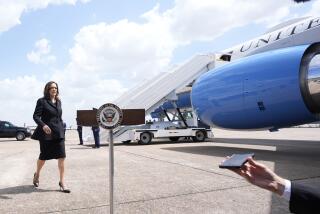U.S. Should Heed the Pain of Grieving Iraqi Families
In January, as the country prepared for war in Iraq, Gen. Tommy Franks told a reporter: “Anything that this country ever commits her military to has a day before, a day of, and a day after.” Now that Saddam Hussein has been toppled from power and Baghdad has fallen, we have come to the “day after.” And that will mean a full reckoning to the Iraqi people of the lives lost during the war.
Before the first bombs were dropped, President Bush pledged: “We will do everything we can to minimize the loss of life, not only American lives but Iraqi civilian lives.” He specifically omitted any mention of the lives of noncivilian Iraqis. But as we attempt now to win the peace as effectively as we won the war, it will be important for the U.S. to acknowledge that the deaths of Iraqi soldiers, many of whom were conscripts or foot soldiers in the decades-long Baath Party revolution, will have as big an effect on Iraqi families as civilian casualties will.
The U.S. “bypass” strategy, that is, the ground war plan of initially skirting towns and population centers and heading straight for Baghdad, was brilliantly conceived to spare civilian lives. And the bombing in Baghdad, which relied entirely on precision-guided weapons, was well designed to minimize civilian damage and leave electrical power largely intact.
But war brings death. And once the initial battle script ran its course, it became obvious that “shock and awe” had not obviated the need for a ground assault. The Iraqi opposition, though ineffective in conventional military terms, drew the United States and Britain into urban battles, which meant that fighting happened where people live. And fighting in urban areas meant that Iraqis in large numbers -- civilians and soldiers -- would die.
In the coming days and weeks, we will begin to assess the human cost of the Iraq war. And because of our military superiority -- and the destructiveness of our firepower -- we are likely to find that a surprisingly high number of Iraqis died in this short war. In Baghdad, and in towns and cities across much of Iraq, hospitals without reliable electricity and clean water are overwhelmed with injured. Corpses lie in the streets. Morgues are overflowing. Countless civilian homes have been reduced to rubble.
So what should the U.S. do? Acknowledge the losses and be sensitive to the pain they have caused Iraqis.
A scorecard of Iraqi civilian or military casualties is not the point here. An accurate body count may not be possible, and is certainly unnecessary. What is important is that every one of those deaths -- civilian and military -- left a grieving family that we have to now acknowledge.
The U.S. cannot, of course, make actual reparations, and this administration is unlikely to issue an apology. Nor should it; casualties are a fact of war. But it is crucial that America be scrupulously honest, sensitive and open in addressing the question of civilian harm and overall casualties.
Do the war planners understand this? If the way they addressed questions about the deaths of three journalists at the Palestine hotel and elsewhere in Baghdad last week is any indication, they do not. Spokesmen at the Pentagon and U.S. Central Command in Doha, Qatar, adamantly insisted that U.S. forces acted “consistent with the inherent right of self-defense.”
“Initial reports indicate that the coalition force operating near the hotel took fire from the lobby of the hotel and returned fire,” Brig. Gen. Vincent Brooks of CentCom said. Maj. Gen. Buford Blount, commander of the 3rd Infantry Division, said: “The tank was receiving fire from the hotel ... and engaged with one tank round. The firing stopped.”
The U.S. explanation is legally and doctrinally sound. It is probably even accurate. The U.S. tank did what it was supposed to do in the heat of battle. But the people left behind to wonder what went wrong should have a full explanation of what happened rather than simple pronouncements that the military was correct in its actions.
Military spokesmen and commanders must recognize the political dimensions of their response to these incidents. They must understand that the danger for America is and has always been that we win the war and lose the peace.
The military can express sorrow to survivors without apologizing for its actions. It can give a full explanation of the circumstances on the ground without assessing blame. What we have heard so far is that it’s all Hussein’s fault, every lost life, every destroyed building, every hungry child. And in the end, that won’t satisfy anyone.
The tank commander on that bridge Monday no doubt perceived a threat. (Last week, he apologized for the journalists’ deaths but said he had no choice because his soldiers’ lives were endangered.) The journalists and others in the building can second-guess him all they want, but when you’re sitting in a vulnerable tank in broad daylight in downtown Baghdad and somebody is shooting at you, you take action. Would it have been so hard for the U.S. to explain his situation, give a picture of the view from the ground, and then acknowledge the pain of those caught in the cross-fire?
We have become so used to air power and its increasing ability to minimize civilian harm that we’ve forgotten what military forces really do to each other on the ground. And military brass have lost sight of how to explain their actions to the public, both here and in Iraq.
Except where war crimes were committed -- in which case the perpetrators should be vigorously prosecuted -- the U.S. should refrain from accusations. Let’s not blame Hussein. Let’s not blame the Republican Guard or Iraqi military planners. Let’s instead just be sensitive to the magnitude of the Iraqi people’s loss, and be open and truthful in explaining our actions.
More to Read
Get the L.A. Times Politics newsletter
Deeply reported insights into legislation, politics and policy from Sacramento, Washington and beyond. In your inbox three times per week.
You may occasionally receive promotional content from the Los Angeles Times.










